Low-level traffic stops decrease; Saudi women in the workplace increase
Loading...
In growing recognition of how policing of roadways affects people differently, communities are putting the brakes on drivers being pulled over for infractions such as a broken taillight.
1. United States
Philadelphia is banning low-level traffic stops. Civil rights groups have long noted how low-level traffic violations are disproportionately levied against Black drivers. Black people make up less than half of Philadelphia’s population, but accounted for 72% of traffic stops from October 2018 through September 2019. Pretextual stops are a means of racial profiling, say advocates, and degrade trust between the community and law enforcement.
Why We Wrote This
In our progress roundup, governments are giving more freedom to those who’ve been denied it. Policing in one city takes a more humane approach to Black drivers, and myriad opportunities open up for women in Saudi Arabia.
City Councilmember Isaiah Thomas worked with local law enforcement to develop the Driving Equality Bill, which prohibits traffic stops for minor violations such as a broken taillight or a small item hanging from a mirror. “To many people who look like me, a traffic stop is a rite of passage. ... We plan our social interactions around the fact that it is likely that we will be pulled over by police,” said Mr. Thomas. Police can still ticket motorists by mail. The bill will go into effect early next year after officers are retrained. Although Philadelphia is the largest city to enact such laws, other state and local governments, including the state of Virginia and city of Minneapolis, have also adapted traffic stop policies.
CNN, NPR
2. Canada
A startup is harnessing drone technology to boost reforestation in Canada and beyond. Boreal forests store nearly twice as much carbon as tropical rainforests. Traditional reforestation efforts are struggling to keep up with the growing threat of forest fires and logging, but the Toronto-based company Flash Forest sees a solution.
The group retrofits drones to release 3D-printed seed pods – pre-germinated seeds, nutrients, and fungi – with computer-programmed precision. Each machine dispenses pods at nearly 10 times the rate of planting by hand, and one pilot can operate five drones at a time. This spring, the team used drones and aerial mapping software to plant hundreds of thousands of seed pods containing 19 species across 13 pilot sites in Canada, including burn sites in northern Alberta and Ontario. While it will be some years before the seedlings mature and the success of these missions can be accurately assessed, the Flash Forest team has committed to planting 1 billion seed pods by 2028.
The Washington Post, Canadian Business, Forbes
3. Nigeria
A solar battery startup is making green energy more accessible in Nigeria. Due to utilities mismanagement, half of the country’s electricity needs are met through self-generated power, and many Nigerians rely on expensive, polluting diesel generators to manage rolling blackouts. But customers of a corner store have an alternative: Shoppers can rent a portable, solar-charged lithium battery.
In Lagos, Reeddi collects the empty batteries and recharges them off-site. In the future, it plans to automate this process by installing solar-powered vending machines to charge the batteries. Each Reeddi capsule costs 50 cents per day and has ports to charge phones, lamps, laptops, and similar devices. The modular design also allows users to combine capsules to meet heftier power needs. Reeddi is working to expand services throughout Nigeria, bringing a reliable and affordable energy solution to communities in need. The clean technology startup was a finalist for the £1 million ($1.36 million) Earthshot Prize for its effort to eliminate barriers to green energy. “Our goal is to make energy access as easy as buying milk,” says CEO Olugbenga Olubanjo.
Freethink, Fast Company, Earthshot Prize
4. Saudi Arabia
More women are entering the Saudi workforce amid social and political changes. Saudi Arabia’s efforts to modernize – combined with recent government subsidy cuts and taxes – are drawing more women into the labor market. Today, 33% of workers are women, double the 2016 figure. Although the nation’s few working women were previously restricted to positions as teachers or medical personnel to maintain gender segregation, women of different ages and education backgrounds are now entering new spheres, including supermarkets, restaurants, and private firms.
The country is still committed to conservative traditions, and men hold the vast majority of power. King Salman’s Cabinet features no women, the country’s gender pay gap is 49%, and harassment and exploitation remain a problem. However, observers say norms are shifting, and looser restrictions on gender mixing and male guardianship are opening up new possibilities. There are more than 900,000 Saudi women working in private firms today, says economist Jennifer Peck, up from 56,000 in 2010. And those who’ve been working for decades are seeing more confidence among their female colleagues. “In my day, we were too scared to even ask for a salary,” says Rana Alturki, who has worked at her father’s oil and gas firm since 2000. “But girls these days – they come in and negotiate hard. They know their worth.”
Reuters
5. China
China’s wetlands are showing signs of recovery after decades of decline. Although they harbor vital plant and animal species and help sequester carbon, coastal wetlands are among the world’s least-protected ecosystems. A 2018 intergovernmental report found that the world lost 35% of global wetlands between 1970 and 2015. China lost about half its coastal wetlands in the latter half of the 20th century as the country opened to international trade, sparking development in coastal zones.
However, a recent analysis of satellite imagery from 1984 through 2018 shows China’s wetland areas rebounding after 2012. The study, conducted by a team of international scientists and published in the journal Nature Sustainability, suggests that government conservation programs are yielding results in three types of wetland areas: mangroves, tidal flats, and salt marshes. It is one of the first studies to use satellite technology to assess changes to wetland habitats nationwide. “It’s encouraging that we start to see some improvement in coastal wetlands,” said lead author Xiangming Xiao. “It’s demonstrated that there is still hope.”
Mongabay









